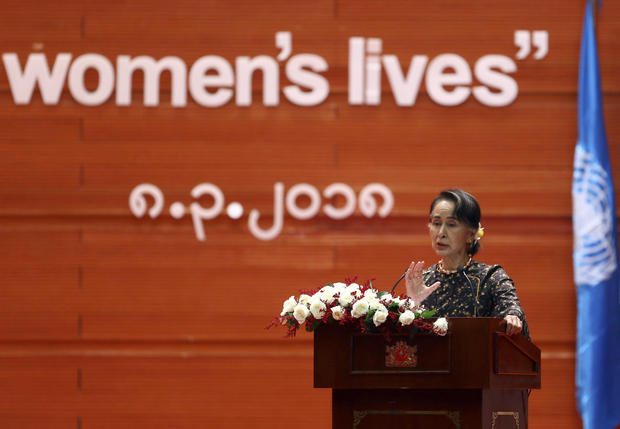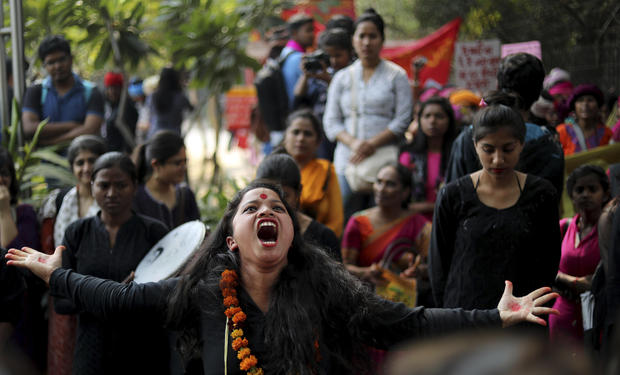International Women's Day protests amplify feminism in Asia
MANILA, Philippines — In Manila, they decried the president as a violator of women’s rights. In Seoul, the surging #MeToo movement took to the streets. In India, where endemic violence against women has only recently become part of the public conversation, they marched toward Parliament loudly demanding their rights.
It was International Women’s Day on Thursday, and as the day began in Asia tens of thousands of women ensured it could not go unnoticed.
Hundreds of activists in pink and purple shirts protested in downtown Manila against Philippine President Rodrigo Duterte, calling him among the worst violators of women’s rights in Asia. Protest leaders sang and danced in a boisterous rally in Plaza Miranda, handing red and white roses to mothers, sisters and widows of drug suspects slain under Duterte’s crackdown on illegal drugs.
Protesters shout slogans against President Rodrigo Duterte during a rally to mark International Women’s Day, March 8, 2018 in Manila, Philippines.
AP
In Myanmar, embattled leader Aung San Suu Kyi urged women to build peaceful democracies using their strength in politics, economics and social issues. In Europe, protesters in Spain got an early start, launching a 24-hour strike and calling on women to stop working, whether at offices or at home.
And in China, students at Tsinghua University used the occasion to make light of a proposed constitutional amendment to scrap term limits for the country’s president.
One banner joked that a boyfriend’s term should also have no limits, while another said, “A country cannot exist without a constitution, as we cannot exist without you!”
China’s ceremonial legislature is poised to pass a constitutional amendment to allow President Xi Jinping to rule indefinitely. Photos of the students’ banners, like other content about the proposed amendment, were quickly censored on social media.
Hundreds of South Koreans, many wearing black and holding black #MeToo signs, rallied in central Seoul. They called for sex offenders to be brought to justice, and for action on issues including the gender pay gap.
South Korea’s #MeToo movement has gained significant traction since January, when a female prosecutor began speaking openly about workplace mistreatment and sexual misconduct. The list of women who speak out is growing day by day.
Several high-profile men have resigned from positions of power, including a governor who was a leading presidential contender before he was accused of repeatedly raping his female secretary.
Suu Kyi’s speech marked the third International Women’s Day celebrated in Myanmar under a civilian government. She led her party to a landslide victory in 2015 elections and leads the government, even though the country’s constitution bars her from the presidency.

Myanmar’s leader Aung San Suu Kyi delivers a speech during a ceremony to mark International Women’s Day, at the Myanmar International Convention Centre in Naypyitaw, Myanmar, March 8, 2018.
AP
“A country’s human rights values will be enhanced when women are granted their rights,” she said.
Philippine protesters condemned the thousands of people they say died in extrajudicial killings – accusations the police deny.
Protest leader Jean Enriquez also railed against Duterte’s anti-women remarks, saying: “We’re so alarmed. We have seen his direct attacks on women under his iron-hand rule and it’s now time to heighten our resistance.”
Human rights groups have condemned Duterte’s sexist remarks, including one in which he asked troops to shoot female communist rebels in the genitals.
In India, hundreds of women, including students, teachers and sex workers, marched through the capital to bring attention to domestic violence, sexual attacks and discrimination in jobs and wages.

An Indian woman performs a street play highlighting domestic violence before the start of a march on International Women’s Day in New Delhi, India, March 8, 2018.
AP
“Unite against violence against women,” one placard urged. “Man enough to say no to domestic abuse,” said another. “My body, My choice.”
India had its first female leader in 1966 when Indira Gandhi became prime minister, but Indian women are still often relegated to second-class citizenship.
Prime Minister Narendra Modi, though, insisted in a tweet that things are changing. “Several women have left an indelible mark in the history of humankind,” he said.





Leave a Reply